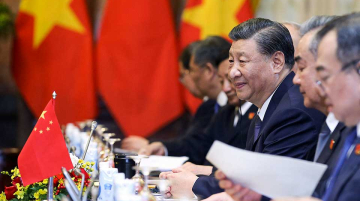
By Felix Brender 王哲謙
This week, the Communist Party set a rather ambitious GDP growth target of 5%, doubling down on China’s growth narrative and development success story without qualifications. At the same time, CNN and Al Jazeera are reporting on PRC citizens migrating to the U.S. across Central America, with Ecuador — visa-free for PRC passport holders — as their first port of call. This migration has created a thriving, lucrative underground industry around Chinese itinerants, with travel agents promising to make the trip slightly less arduous by providing one-stop-shop solutions at different price points for those managing to cough up the cash one way or the other.
Crucially, CNN reports suggest that the majority of Chinese citizens arriving in the U.S. are looking to apply for asylum. Some — such as “Qian Ge” from Al Jazeera’s mini-documentary — have experienced persecution over political views or religious beliefs. Others cite a lack of future prospects, financial hardship, and overall staggering social inequality — and these migrants do not solely hail from China’s less developed inland regions.
This certainly clashes with the official story China likes to tell. Notably, it casts doubt on the fragile and, at times, awkward gentlemen’s agreement between the rulers and the ruled underpinning decades of breakneck-speed development: that some, in Deng Xiaoping’s words, would get wealthy first, but that the Chinese model ultimately meant riches for all.
Instead, the sobering realization that making it in China isn’t all that straightforward after all. Choosing the Pan-American route into the U.S. then might just be an addition to the existing arsenal of Chinese popular disengagement, i.e. lying-flatism, (legal) runology, and involution: a response to the perceived or actual futility of putting your back into your career in China today.
Intriguingly, this disenchantment with the Chinese model echoes overseas. At a scale unthinkable a few years ago, criticism and downright anti-Chinese sentiment has been spreading even among China’s oldest and steadfast friends, such as Zambia. As Chinese actors remain keen to highlight, Sino-Zambian ties reach back to the era of anti-colonial struggles, and Zambia used to be among China’s most optimistic cheerleaders in East Africa.
Many experts believe that an inflation-driven cost-of-living crisis is primarily driven by Zambia’s enormous debt to China and China’s unwillingness to accept a haircut. After earlier such attempts had been rejected by China, bankrupt Zambia finally signed a restructuring deal with its two large creditors, India and China, last week, the details of which remain confidential.
Yet, much irreparable damage has been done — disillusionment with Chinese solutions had been brewing for years before erupting in anti-Chinese violence. Remarkably, Zambian grievances tally with those we hear from Chinese lie-flatters and runologists: disrespect, appalling conditions in Chinese-owned workplaces, and financial woes, in conjunction with a well-evidenced lack of transparency and entanglement in the quagmires of governmental corruption. Zambian opposition politicians have been sure to leverage and promote anti-Chinese attitudes.
Dramatically dropping Zambian approval of China may mainly be triggered by China — and some Zambians — (unintentionally) overpromising. Or perhaps Zambians sense, just like their peers in China, that while some might get rich first, most will be relegated to merely helping others get there.
Felix Brender 王哲謙 is a PhD candidate at the London School of Economics & a project associate at LSE Ideas. Lukas Fiala is the project coordinator for the China Foresight initiative at LSE IDEAS.








